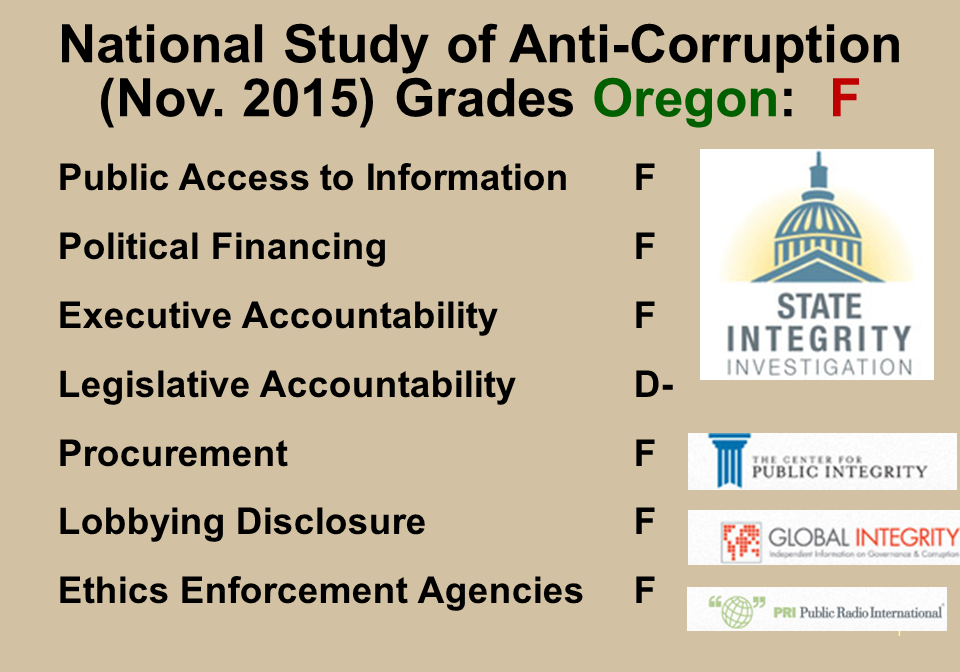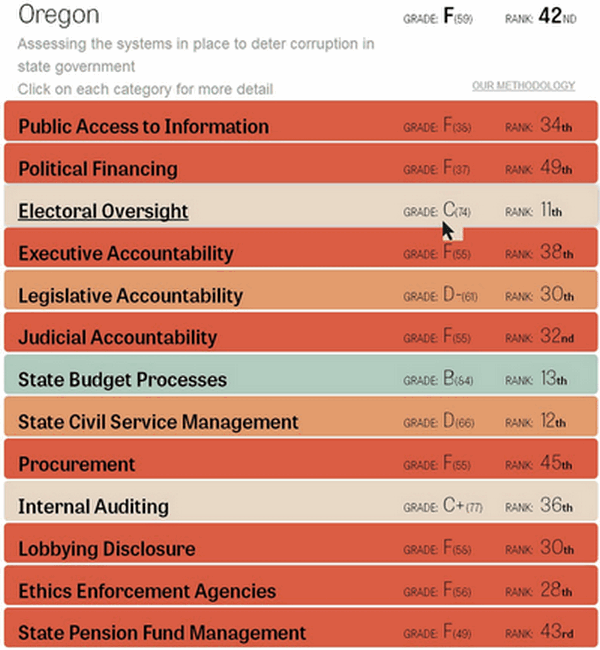- HOME
- Email Signup
- Issues
- Progressive Party Positions Table
- Iraq & Syria
- Progressive Party 2014 Voter Pamphlet Statement
- Cease negotiations of TPP
- Ferguson & Inequality
- Police Body Cameras
- 28th Amendment to U.S. Constitution
- Health Care
- Essays
- End Political Repression
- Joint Terrorism Task Force
- Pembina Propane Export Terminal
- Trans-Pacific Partnership
- Progressive Platform
- Register to Vote
- Calendar
- Candidates
- Forums
- Press Coverage
- Contribute
- About OPP
- Flyers, Buttons, Posters, Videos
- Actions
ethics
Oregon Progressive Party Commends Rep. Julie Parrish
Submitted by info on Fri, 08/19/2016 - 23:44
The State Council of the Oregon Progressive Party issued this statement:
The Oregon Progressive Party commends Julie Parrish for doggedly pursuing government ethics reform and transparency in government. The Party endorsed her 5 ethics and transparency bills in 2015, all of which were nullified on party line votes (Democrats voting "no"). She also supports our central priority of achieving campaign finance reform in Oregon, including amending the Oregon Constitution, if necessary, and requiring that political ads identify their funders. She is also a defender of the right of citizens to use the initiative process to enact what the Legislature won't.
- info's blog
- Login to post comments
State Integrity Investigation gives Oregon an F
Submitted by info on Mon, 11/09/2015 - 17:27
The long-standing State Integrity Investigation of the Center for Public Integrity and Public Radio International has granted Oregon an overall F grade on avoiding corruption in state government.
Oregon's overall rank fell from 14th to 42nd, the biggest drop of any state.
We have been saying for years that Oregon's lack of limits on political contributions and repeal of laws requiring that political ads identify their funders makes Oregon government inherently corruptible. Now the leading national investigation of State integrity agrees with us.

 |
- info's blog
- Login to post comments
Sunlight Foundation Too Generous in Giving Oregon a D on Lobbyist Disclosure
Submitted by info on Thu, 08/13/2015 - 02:14
Update (August 13): The Sunlight Foundation, having been notified by us about HB 2058, has now downgraded Oregon to an F, joining Florida, Nevada, and West Virginia in the F category.
The Sunlight Foundation issued a report on August 12 , 2015, rating each state's lobbying disclosure requirements. They assigned Oregon a grade of D, but that grade was based on their error in failing to account for the new bill passed by the 2015 Oregon Legislature (and not vetoed by Gov. Kate Brown), HB 2058.
That law allows lobbyists to avoid reporting for the next 2 years what amounts to over 99% of their expenditures. So Oregon now clearly deserves a -1 on the Expenditure Transparency criterion, which would give Oregon a correct overall score of -3 and place it firmly in the "F" category in the Sunlight Foundation analysis, along with only 3 other states (Florida, Nevada, West Virginia).
I testified to the Oregon Legislature (on behalf of Oregon Progressive Party) that I was "in the rare position of agreeing with an editorial in the Bend Bulletin, which pointed out that this bill would relieve lobbyists of the obligation to report all but $92,000 of the over $26 million actually spent on lobbying in Oregon in 2014."
"This 99.6% reduction in reporting of such spending seems particularly inappropriate in light of the recent events that caused the resignation of Governor Kitzhaber. Oregon needs more disclosure of money in politics, not less, and lobbying spending is definitely part of money in politics."
It was the only written testimony against HB 2058, which passed the Oregon House by a vote of 42-16, with Democrats providing 24 of the yes votes. It passed the Oregon Senate by a vote of 18-11, with Democrats providing all of the yes votes.
Here is the Oregonian article on the Sunlight Foundation report.
- info's blog
- Login to post comments
Oregon Democrats Reject 3 More Reasonable Ethics Reforms
Submitted by info on Thu, 06/18/2015 - 14:36
On June 17, these 3 bills were "withdrawn" directly to the floor of the Oregon Senate by their Republican sponsors. All were then rejected on straight party-line 18-12 votes, with all Democrats voting against them.
-
SB 940 makes “vote trading” illegal for legislators, ensuring they put their constituents first and not vote based on future promises of campaign contributions.
-
SB 853 places high-ranking agency and elected officials under oath when testifying before the Legislature. This is the ordinary procedure in the U.S. Congress.
- SB 852 makes submitting false information in a candidate voters’ pamphlet statement illegal.
- info's blog
- Login to post comments
Oregonian: State Treasurer employees get $475,000 in bonuses, as funds they manage lose 27% of value
Submitted by info on Wed, 04/21/2010 - 04:19
Oregon Treasurer's fund managers get thousands in bonuses
by Michelle Cole
September 30, 2009
Eleven employees in the Oregon treasurer's office received bonuses in February ranging from $9,860 to $57,006.
The money was paid as a performance reward to investment managers who oversee the Oregon Public Employees Retirement Fund, the Common Schools Fund and other portfolios totaling about $60 billion.
. . . Last year, with the nation mired in recession, the Public Employees Retirement Fund was down 27 percent, which was not comforting to thousands of retirees but in line with other public pension systems. Based on the performance of the fund and other state funds, 11 of the 14 investment managers in the treasurer's office were paid a total of $475,000 in bonuses and related costs.
Oregonian: Treasurer Calls for Reform of . . . Treasurer's Office
Submitted by info on Wed, 04/21/2010 - 04:07
Oregon Treasurer Ted Wheeler calls for travel audit, agency reform
by Les Zaitz and Ted Sickinger
April 14, 2010
State Treasurer Ted Wheeler stepped up his efforts Wednesday to reform his agency in the wake of disclosures that employees have been traveling in luxury at the expense of the investment firms they oversee.
Wheeler has asked Secretary of State Kate Brown to evaluate travel undertaken last year by state investment officers.
He also said he will appoint a citizens panel to review the agency's travel policies and recommend changes. He said he would then ask the Oregon Government Ethics Commission to endorse a new travel policy.
- info's blog
- Login to post comments
- Read more
Oregonian Article on State Treasury Officers Golfing on State Time and State Dime
Submitted by info on Wed, 04/21/2010 - 03:49
Despite state ethics rules, Treasury officials golf regularly on duty
by Les Zaitz and Ted Sickinger
April 11, 2010
For years, the Oregon State Treasurer's office has had a laissez faire policy on staff participation in golf outings while on duty and traveling on state business.
Ron Schmitz, Treasury's chief investment officer, said such outings had been approved by the agency's senior executives and vetted by agency attorneys, despite state law that in some circumstances prohibits taking free outings.
- info's blog
- Login to post comments
- Read more


